-
2020-06-09
-
八年级下册英语电子书图片下载,精选全套课程教材!英语单词学习!
2020-06-09
-
2020-06-09
-
贵州贵阳初中英语夏令营效果如何,可以分享一下吗?暑假培训课程!
2020-06-09
-
福建福州好点的英语培训机构有哪些方面?培训学校哪家好?青少年英语教育机构加盟
2020-06-09
更新时间:2020-06-09浏览:次评论: 条
2020-06-09
八年级下册英语电子书图片下载,精选全套课程教材!英语单词学习!
2020-06-09
2020-06-09
贵州贵阳初中英语夏令营效果如何,可以分享一下吗?暑假培训课程!
2020-06-09
福建福州好点的英语培训机构有哪些方面?培训学校哪家好?青少年英语教育机构加盟
2020-06-09
| eh | excl.嗯,什么,啊 |
| litter | n. 垃圾,杂物 vi.&vt.乱丢杂物 |
| tap | n.水龙头;旋塞 |
| run | vi.流动 |
| pick | vt.采,摘 |
| obey | vt. &vi. 遵守,顺从 |
| queue | vi. (人、车等)排队等候 |
| turn | n.轮流,(轮流的)顺序 |
| proper | adj.符合习俗的;正确的 |
| greet | vt. 问候,打招呼 |
| shake sb's hand | 与某人握手 |
| kiss | n.亲吻 |
| close | adj.亲密的;严密的 |
| conversation | n.(非正式)交谈,谈话 |
| avoid | vt. 避免 |
| subject | n.话题;主题 |
| behave | vi.&vt.表现 |
| public | n.民众,群体 adj.公共的,公开的 |
| in public | 公开地,在别人面前 |
| push | vi.&vt.推,挤 |
| push in | <英>插队,加塞 =<美>cut in |
| bump | vi.&vt.撞,碰 |
| touch | vt. 触摸,碰 |
| excuse | vt. 原谅,宽恕 |
| excuse me | 劳驾 |
| till | conj. 到...时,直到...为止 |
| as | conj. 正如,如同 |
| saying | n.谚语,格言 |
| Roman | n. 罗马人 |
| by accident | 偶然,意外地 |
| discussion | n. 讨论 |
| express | vt. 表达 |
| explain | vt. &vi. 解释 |
| warn | vt.&vi.警告,告诫 |
| parking | n. 停车 |
| successful | adj. 成功的 |
| sometime | adv.(=some time)在某时 |
| soon after | 不久以后 |
| risk | vt.冒险做 |
| worm | n. 软体虫,蠕虫 |
| pain | n. 痛,疼痛 |
| gain | n.收获 |
| indeed | adv. 真正地 |
| practice | n. 练习;训练;实践 |
| candle | n. 蜡烛 |
| purpose | n. 目的 |
| content | n. 内容,;目录 |
| conclusion | n.总结,归纳 |
| guest | n. 客人,宾客 |
| host | n.主人;主持 |
| above all | 首要的是 |
| impolite | adj. 不礼貌的 |
| manner | n.礼貌,礼仪;规矩 |
| cut in on | 打断(谈话),插嘴 |
| polite | adj. 礼貌的 |
| in someone's way | 挡住某人的路 |
| as well | 也,还有 |
| loud | adj. 大声的 |
| keep from | 保护,使免受 |
8B Unit5 电子课本
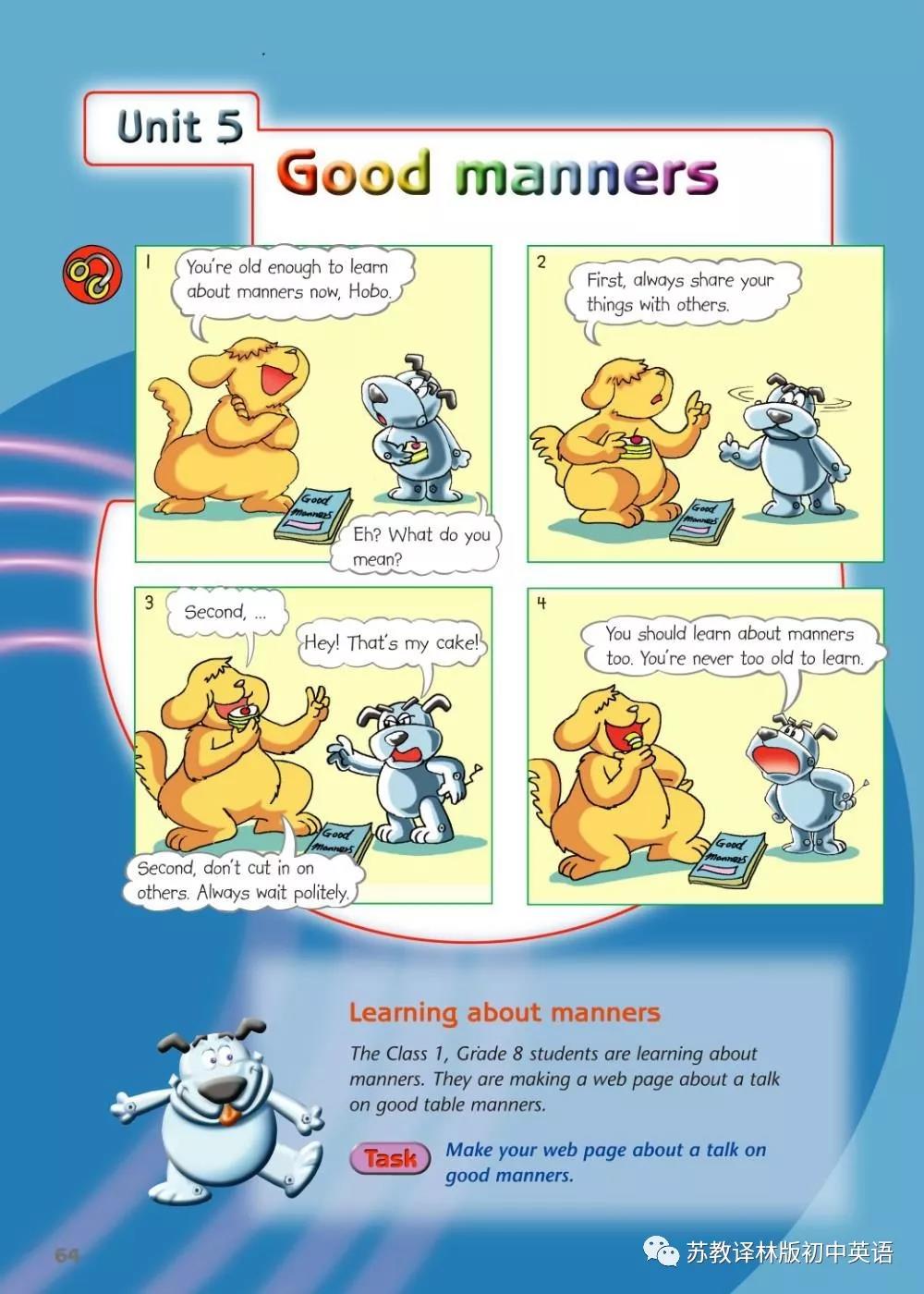
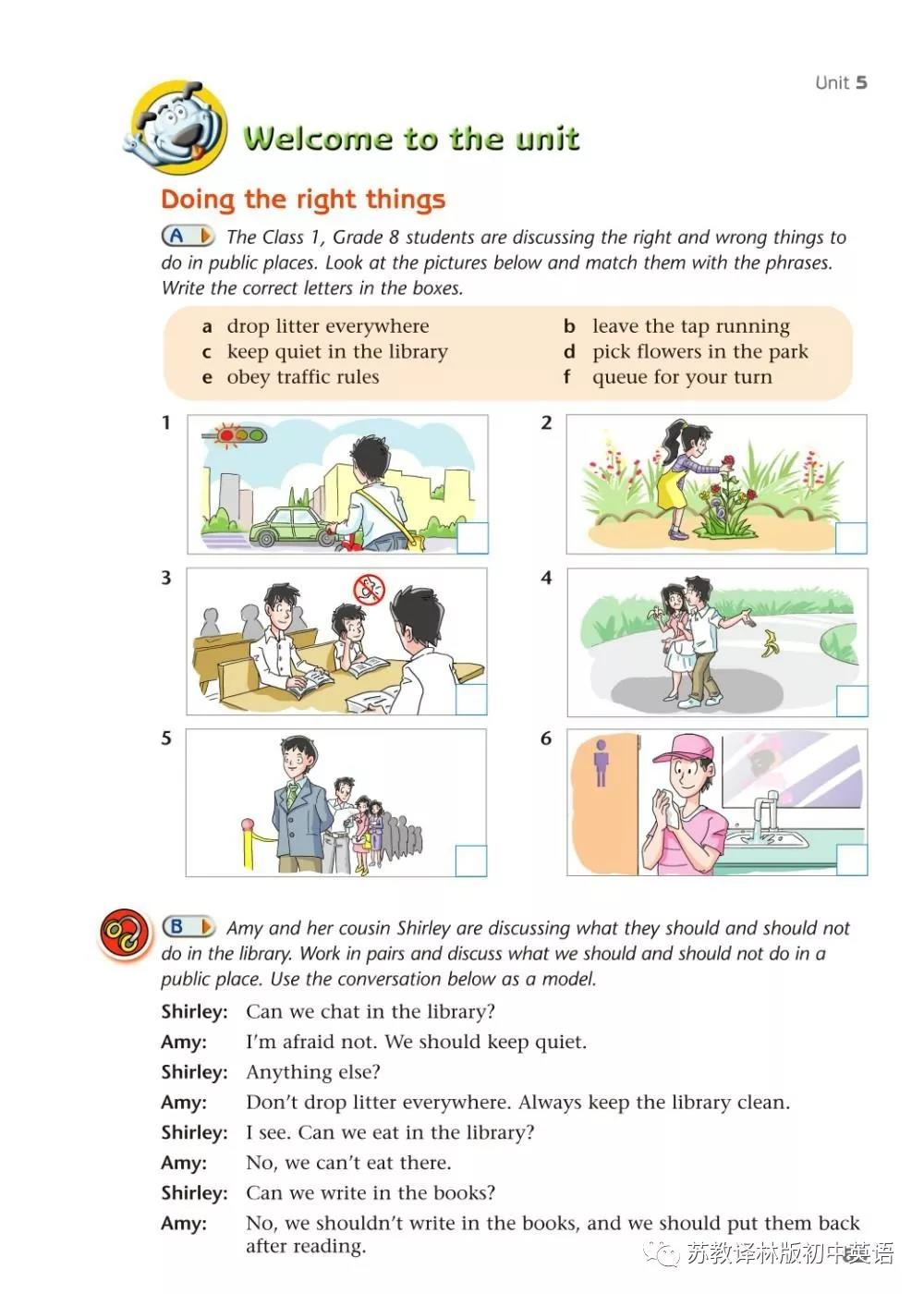
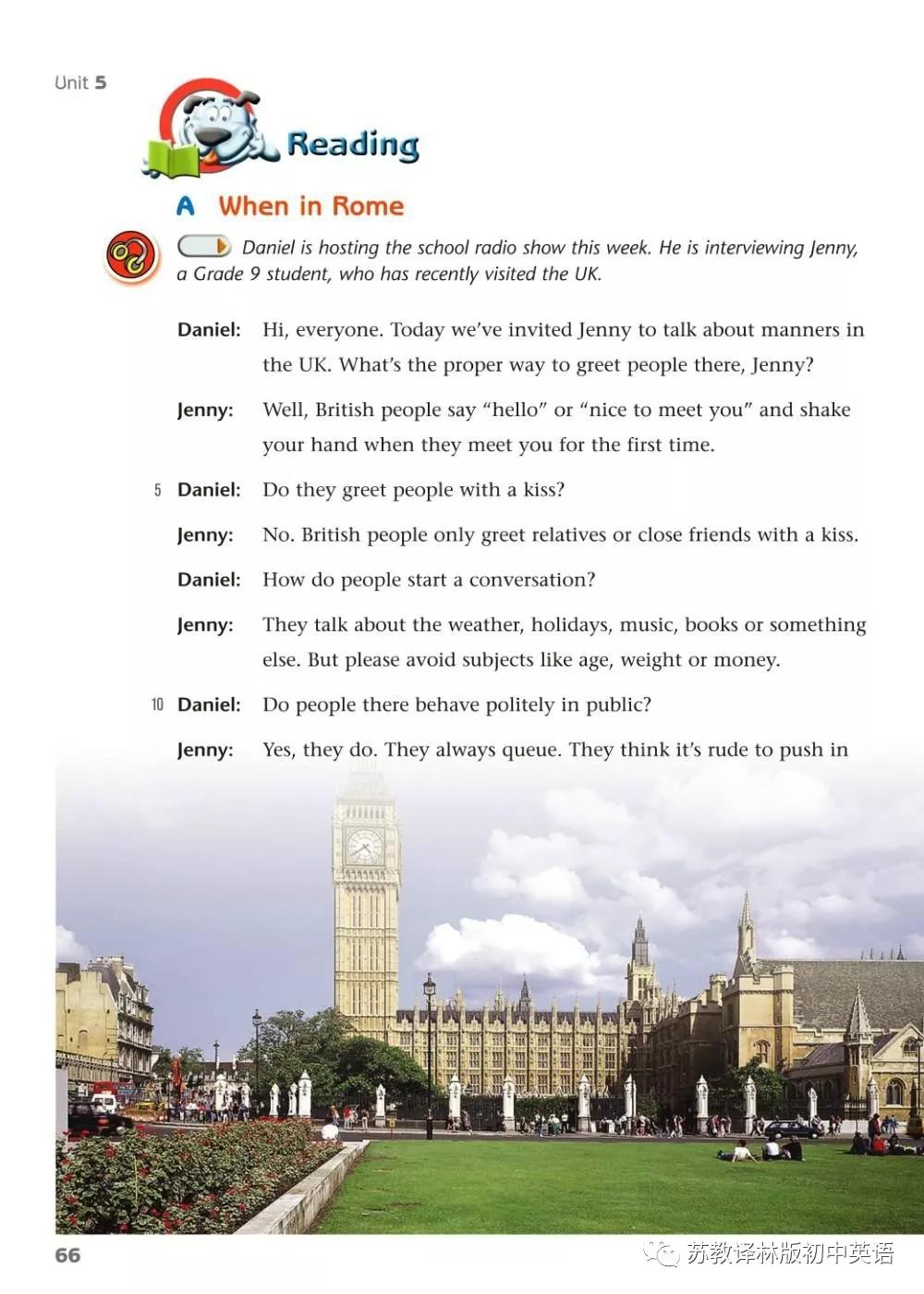

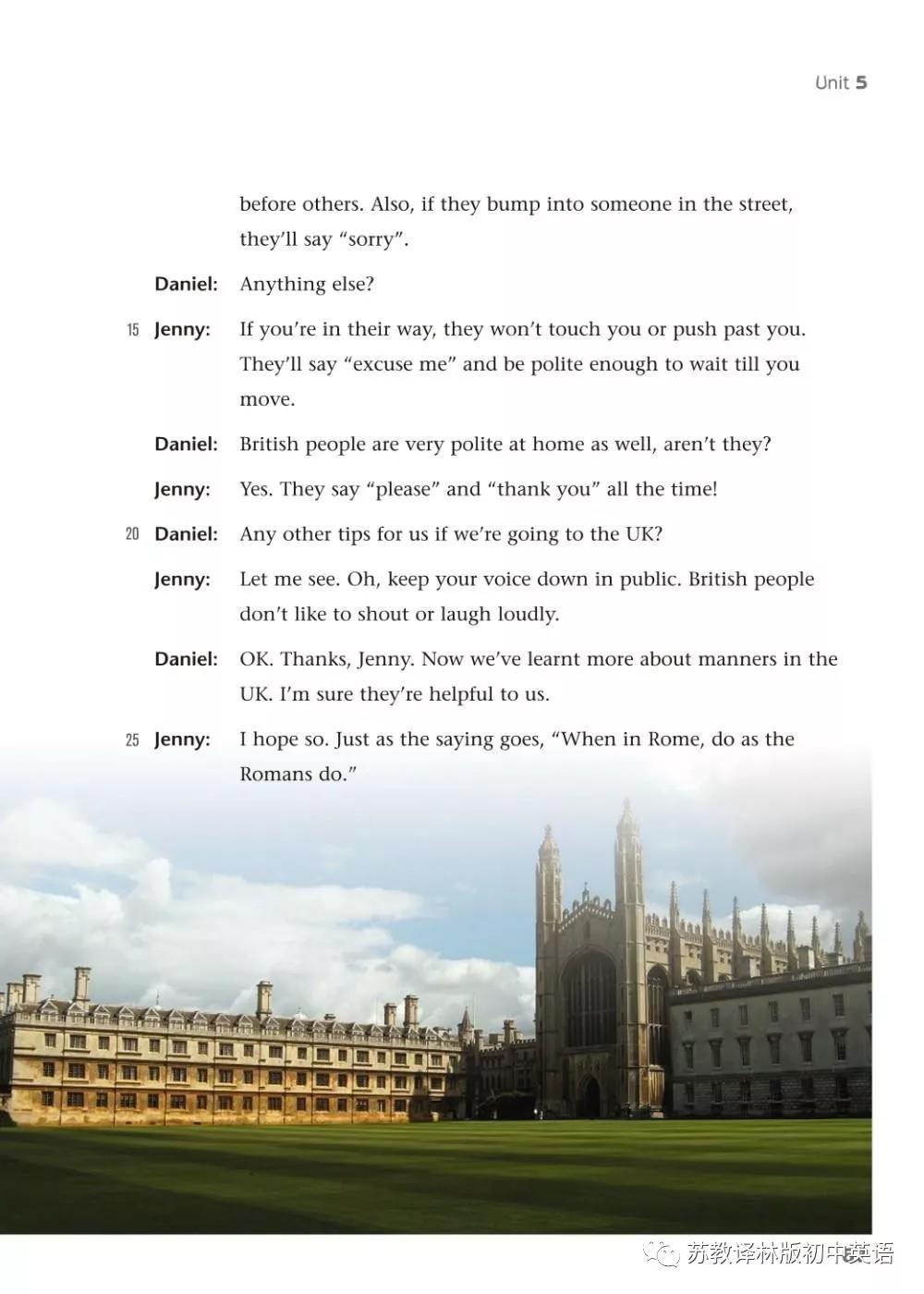

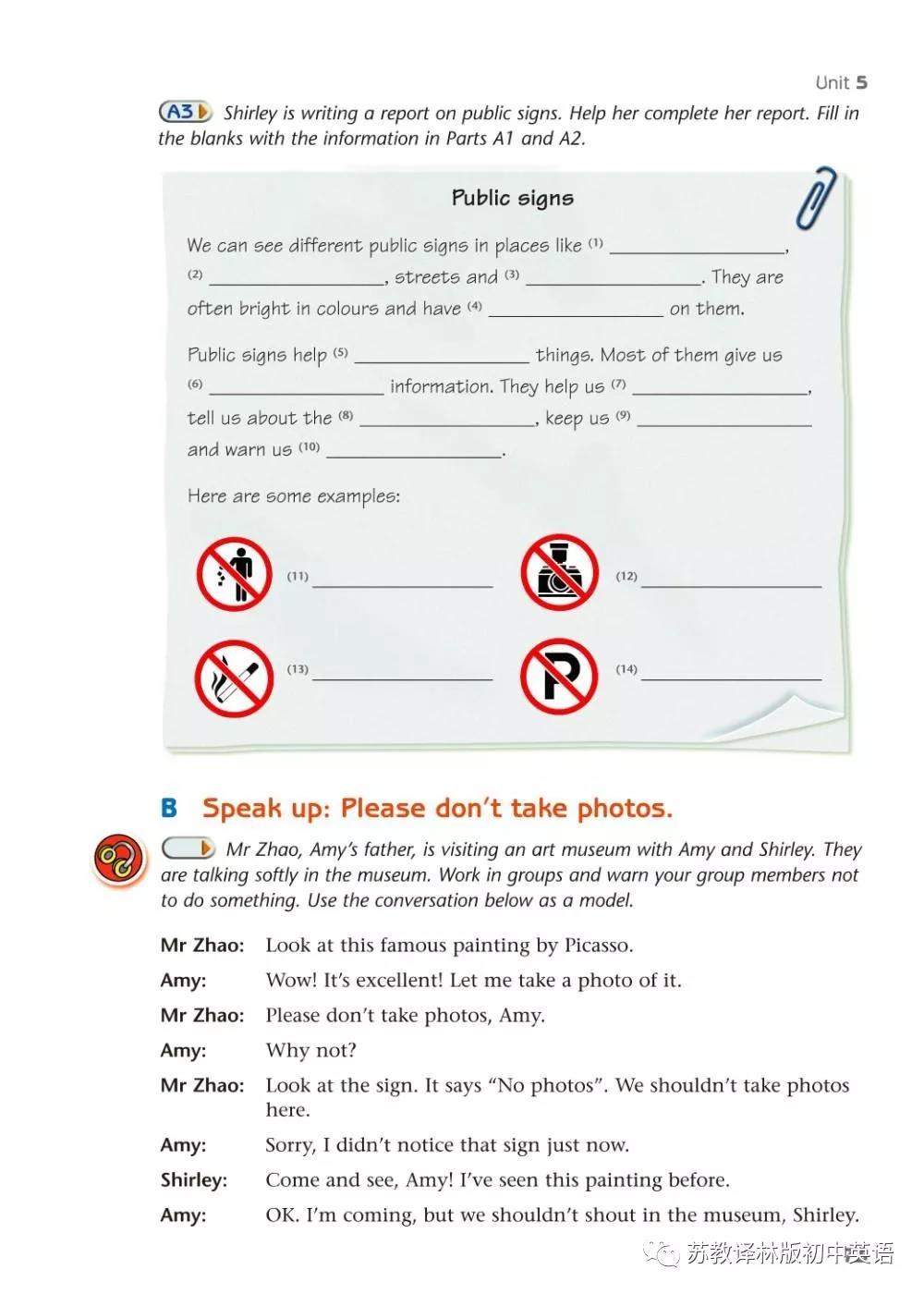
8B Unit5 Good manners
【词汇拓展】
1. polite adj. → politely(adv.)
2. proper adj. → properly(adv.)
3. loud adj. → loudly (adv.)
4. say v. →saying (n.) 谚语
5. discuss v. →discussion (n.)
6. park v. →parking (n.) 停车
7. polite adj. →impolite (反义词)
8. warn v. → warning (n.)
【重点短语】
1. cut in on sb/sth 打断(谈话),插嘴
2. drop litter everywhere 到处扔垃圾
3. keep quiet 保持安静
4 leave the tap running 使水龙头一直流着
5. pick flowers 摘花
6. obey traffic rules 遵守交通规则
7. invite sb to do sth 邀请某人做某事
8. keep the library clean 保持图书馆干净
9. the proper way to do sth 做某事的恰当方式
10. say hello to sb 向某人问好
11. for the first time 第一次
12. talk about 谈论
13. in public 在公共场合
14. laugh loudly 大声地笑
15. by accident 偶然地,意外地
16. greet each other 互相问候
17. any time 任何时候;随时
18. on one's own 单独
19. join the discussion 加入到讨论中
20. express oneself clearly 清楚地表达自己
21. write down 写下,记下
22. be busy with/doing sth 忙于(做)某事
23. warn sb of sth 警告某人某事
24. keep sb away from danger 使某人远离危险
25. no smoking 禁止吸烟
26. soon after 不久以后
27. in order to 为了
28.make one's dream come true 使某人的梦想成为现实
29. practise doing sth 练习做某事
30. the purpose of ……的目的
31.above all 首要的是
32. in one's way挡住某人的路
【重点句子】
1.霍波,你现在够大了,要学习有关礼仪的东西了。
You're old enough to learn about manners now, Hobo.
2. 他们谈论天气、假期、音乐、书或其他的东西。
They talk about the weather, holidays, music, books or something else.
3. 那儿的人在公共场合举止礼貌吗?
Do people there behave politely in public?
4. 他们认为插到别人前面是粗鲁的。
They think it's rude to push in before others.
5. 就像谚语说的“入乡随俗”。
Just as the saying goes, “When in Rome, do as the Romans do .”
6. 基蒂非常忙于上舞蹈课。
Kitty was very busy with her dancing lessons.
7. 这些规则是重要的,因为我们应该确保客人和主人在就餐时都舒服。
These rules are important because we should make sure that both guests and hosts are comfortable at the table.

【词句解析】
1. express vt. 表达
[点拨] express 后面可接反身代词作宾语,通常不接双宾语。
He expressed his thanks to her.他对她表达了他的谢意。
He is still unable to express himself in English.
他仍然不能用英语表达自己的想法。
[拓展] (1)express n. 快车;快邮
The letter was sent by express.
这封信是用快件邮寄的。
(2)express adj. 迅速的;快速的;快递的;准确的,确实的 adv. 用快递方式
It's an express train for Paris.
这是一列开往巴黎的快车。
2.explain vt.&vi. 解释
[点拨] explain 作动词,意为“解释”,后面可直接接sth,不能接sb;“向某人解释某事”应表达为explain sth to sb。
Miss White is patient enough to explain the Maths problem to us many times.
怀特小姐不厌其烦地给我们多次讲解这道数学题。
[拓展] explain的名词形式为explanation, 为可数名词。
His explanations are always difficult to believe.
他的解释总是令人难以置信。
3. cut in (on sb/sth) 打断(谈话),插嘴
Don't cut in on your mother when she is talking.
你妈妈讲话时,不要插嘴。
[拓展] cut in on还可表示“加入;干预;拦住”。
I think I should cut in on what they are doing.
我想我应该对他们所做的事情进行干预。
He was stopped when he tried to cut in on the queue. 他试图超车的时候被人拦住了。
I would like to cut in on this project.
我愿意加入这个项目。
4. leave the tap running 使水龙头一直流着
[点拨] leave作使役动词,意为“使/让……保持某种状态”,后接形容词、动词不定式、分词、名词或介词短语等作宾语补足语。
Leave the door open when you go out.
你出去时,不要关门。
He went out, leaving his papers lying open on the desk. 他出去时,把他的试卷摊在了书桌上。
[拓展] (1)leave 还可译为“留下;丢下;落下”,常表示“把某物落在/忘在某地”。
I left my key in the reading room.
我把钥匙忘在阅览室了。
(2)leave sb alone意为“让某人单独留下”,相当于leave sb by oneself或leave sb on one's own。
Don't leave Jim waiting outside all the time.
不要让吉姆一直在外面等着。
Mrs Green always leaves her daughter at home alone. 格林夫人总是把她的女儿单独留在家里。
(3)leave的过去分词为left, 常用作后置定语,意为“剩下的”。
Is there any water left in the bottle?
瓶子里还有水吗?
(4)leave 作名词,意为“假期”。
He asked his teacher for sick leave.
他向老师请了病假。
5. keep sb from… 使某人免受……
We should keep Millie from trouble.
我们应该使米莉免受烦恼。
[拓展] keep sb from doing sth 意为“阻止某人做某事”,其中from不可省略;其同义短语为stop/prevent sb from doing sth,其中from可以省略。keep sb doing sth 意为“让某人一直做某事”。
Nothing can keep us from realizing our dreams.
没有什么能够阻止我们实现我们的梦想。
He kept me answering the same question.
他一直让我回答同一个问题。
6. sometimes, some times, sometime和some time
(1)sometimes是频率副词,意为“有时候,间或”。
Sometimes I help my mother do some housework.
有时候我帮母亲做些家务活。
(2)some times是名词词组,意为“几次,几倍”。
I met her some times in the street last year.
去年我在街上遇到过她几次。
(3)sometime是副词,意为“某时”。
I saw him sometime last summer.
去年夏天的某个时候我见过他。
(4)some time是名词词组,意为“一段时间”。
I stayed at my uncle's for some time last summer.
去年夏天我在我叔叔家住了一段时间。
7. when, while和as
(1)when意为“当(在)……的时候”,它既可以表示时间点,也可以表示时间段。主句和从句的动作可以同时发生,也可以先后发生。
We were playing outside when it began to rain.
当开始下雨的时候,我们正在外面玩。
(2)while意为“当(在)……时”,它只能指一段时间,不能指时间点。
While I was reading, she was singing.
我看书时,她在唱歌。
(3)as与when,while同义,有时可与它们通用。但它着重指主句和从句中的动作同时发生。
He dropped the glass as he stood up.
他站起来时,把杯子摔了
[拓展] while 作连词时,还有“然而”的意思,表示前后两种情况的对比。它还可用作名词,表示“一会儿,一段时间”。
You like tennis, while I like to read.
你喜欢网球,而我喜欢看书。
It took a long while to do the work.
做这项工作花了很长时间。
8. too, as well, also和either
这四个副词(组)均可表示“也”,但用法不同:
(1)too一般放在句末,通常用逗号隔开。
I am a student, too. 我也是一名学生。
(2)as well 多用于口语中,语气较轻,通常用于肯定句或疑问句中,不用于否定句中,且通常放在句末。
I like you as well. 我也喜欢你。
(3)also 比 too 和 as well 正式,一般也不用于否定句中,它在句中的位置通常是紧靠动词,即放在实义动词之前,情态动词或be动词之后。
He also came.他也来了。
(4)either 通常只用于否定句中,且要放在句末。
I don't know, either. 我也不知道。
9. Do people there behave politely in public?
那儿的人在公共场合举止礼貌吗?
[点拨] (1)politely 是副词,意为“礼貌地”,在句中作状语,修饰动词behave。其形容词形式为polite。
We should speak to the old politely.
我们应该礼貌地跟老人讲话。
(2)public 是名词,意为“公众,民众”,为集合名词。in public意为“当众,在公共场合”。
She used to make a speech in public.
她过去常常在公共场合发表演讲。
It is wrong to leave litter in public places.
在公共场所留下垃圾是不对的。
10. Just as the saying goes, “When in Rome, do as the Romans do.” 就像谚语说的“入乡随俗”。
[点拨] (1)saying是名词,意为“谚语”。
“There's no smoke without fire,” as the saying goes.常言道:“无风不起浪”。
(2)句中的as为连词,意为“像,按照……的方式”,引导方式状语从句,相当于in the way that。
John speaks Chinese as Chinese do.
约翰按照中国人的方式讲汉语。
【重点语法】
1. be +adj.+enough +to do
2. be +too +adj.+to do
奇速英语全国热线:400-1000-028
欢迎关注微信公众号:奇速优课
工号:QS0043
注:图文源于网络,如有侵权请联系我们删除!
坊间流传: 出国留学找 新东方 英语口语找 疯狂英语 应试涨分研学找 奇速英语 奇速英语创始人 蔡章兵教授 奇速英语全国英语十佳
发布时间:2020-06-08 浏览:108次 评论:条
高考英语写作中,除了语法正确、表达准确地道,如果能再用一些较为高级的词汇,会让你的作文脱颖而出,获得评卷老师的青睐和喜爱
发布时间:2020-06-03 浏览:113次 评论:条
这20篇作文的话题和高中生学习生活息息相关,是历次大小考中经常出现的话题,你不需要将它们一一背下来,只需要全部熟读2-3遍,
发布时间:2020-06-03 浏览:62次 评论:条
高考英语,很多考生都会在短文改错、七选五填词和完形填空中扣分,为了让同学们尽量避免扣分,今天我们总结了这三种题型全面的解
发布时间:2020-06-03 浏览:63次 评论:条
2020年国内暑期夏令营,哪家好?暑期将至,小初高学生又迎来了一个“快乐、自由”的休息假日。学生们准备如何度过这个假期呢?是
发布时间:2020-06-03 浏览:124次 评论:条